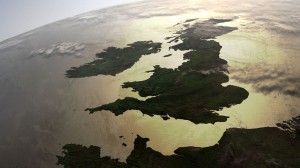Procopius, Brittia and Britain March 14, 2012
Author: Beach Combing | in : Ancient, Medieval , trackbackProcopius is one of the most interesting writers of all antiquity: his discussion of the orifices of Theodora and his detailing of his own walk-on role in the Italian wars proving particularly memorable. But in the thousands of words of his Greek that survive there are many, many other passages that deserve a wider audience: incredibly much of Procopius’ works have not been properly translated into English, or only in editions that are now almost impossible to purchase or borrow. One particularly controversial passage appears in his Gothic Wars (book eight) and gives us an insight into Procopius’ grasp of Atlantic geography.
At about this time [early sixth century] war and conflict came about between the Varni nation and those warriors who live on the island of Brittia and it came about for the following reason. the Varni live beyond the River Ister and live as far as the northern ocean along the river Rhone, which cuts them off from the Franks and the other peoples who dwell in that same region…. The island of Brittia lies in the ocean here not far from the continental coast about 200 stades off and almost opposite the mouth of the Rhine and between the islands of Britain and Thule. For while Britain lies in the west in line with the limits of Spain, separated from the continent by at least 400 stades, Brittia is towards the back end of Gaul, that is the side which is opposite the ocean, to the north of Spain of of Gaul.
Beachcombing is going to breeze over the story here and concentrate on the extraordinary loss of knowledge that is represented by this passage. In 400 AD north-western Europe, save Ireland and the north of Britain was locked into the Empire. It was and had been for several hundred years part of the pax romana. The years roll by and in the early fifth century northern Gaul and the Britains are wrenched from Imperial rule. Procopius born in about the year 500 AD was one of the most learned men to be produced from among the Eastern Romans, the Byzantines, the Romans that survived the onslaught of the fifth century. Yet in just one hundred and fifty years look what has happened to European geography. The uber-educated and sometimes supercilious Procopius can be excused for some stinkers about Thule: which he says is ten times bigger than Britain. Thule is ‘the far north’ in the Roman imagination and could be Scandinavia, Greenland or Iceland or more likely an uneasy mix of all three.
But how has he produced two islands named Britain (actually Brittia and Britannia) in the northern oceans? After all, everyone knows that there is only one major island there. Various explanations have been given over the years. First, that Brittia is Ireland and Britannia is Britain: though this is never going to fly. Second, that one is Britain and the other the British-Celtic settlements in Gaul, namely Brittany, just beginning at this date. Or, third that one is Britain and the other is part of continental Europe, perhaps Denmark. Any other sensible pairings: drbeachcombing AT yahoo DOT com
The most likely explanation (to Beachcombing’s mind) is that Procopius has heard two accounts of one place, Britain. The first account comes from his geographies and perhaps the British-Celtic kings of the west of Britain. The second, from Frankish and Germanic informants who are in contact with or even responsible for those settling the east of Britain in those years: the hundred peoples contained in that off-hand word, ‘the Anglo-Saxons’.
In 400 a messenger could have ridden from Londinium to Constantinople in two weeks on carefully built, beautifully-maintained Imperial roads. By 550 the inhabitants of Constantinople did not even know how many islands there were in the North Sea.
The Mediterranean and the north had been sundered, they would not be properly brought together again before the Renaissance and then only grudgingly.
***
17 Mar 2012: Michael Z, a grand old partisan has written in with this objection: ‘DB, why can’t Brittia be Ireland? Ireland is indeed a major island, close in size to Britain. Not to be overlooked is that the term Great Britain was coined to include Ireland as part of (greater) Britain. Also, if Thule is Greenland, then an estimate of it being ten times larger than Britain is about right (excluding the northernmost part, too cold for the Romans to have accessed).’ Beach would take the point about Thule, though had the Romans got that far to the north? But with Brittia, Brittia seems to be on the wrong side of Britain. However, it is interesting that Procopius does not mention Ireland, something that had appeared in every classical guide for the previous seven hundred years (though with different names).’ Thanks as always Michael!
1 August 2012: Howard W writes in: The quote you give from Procopius is the translation by Dewing I think.
Unfortunately, it is inaccurate. Procopius does not call Britannia an Island. See this alternate translation here: Given that, I think it is entirely plausible that Britannia = Britanny, the name which Gregory of Tours gives it, while Brittia = Britain. Of course it is still remarkable how ignorant of Britain Procopius is. Thanks Howard!



